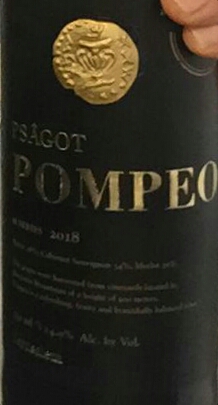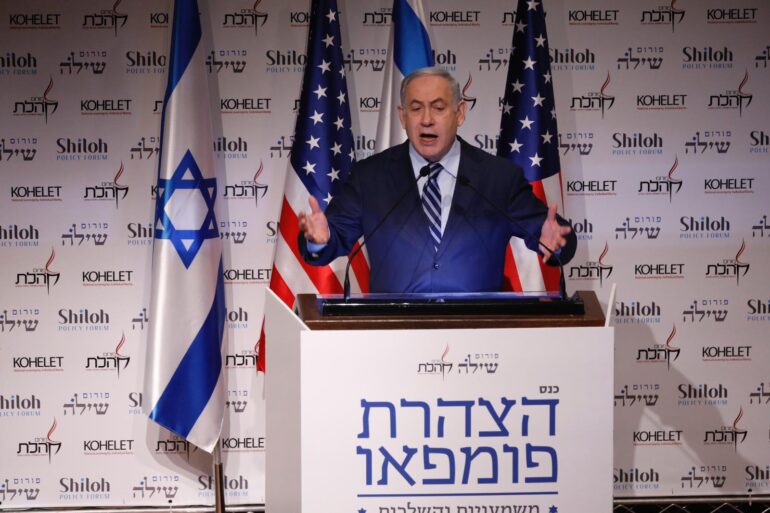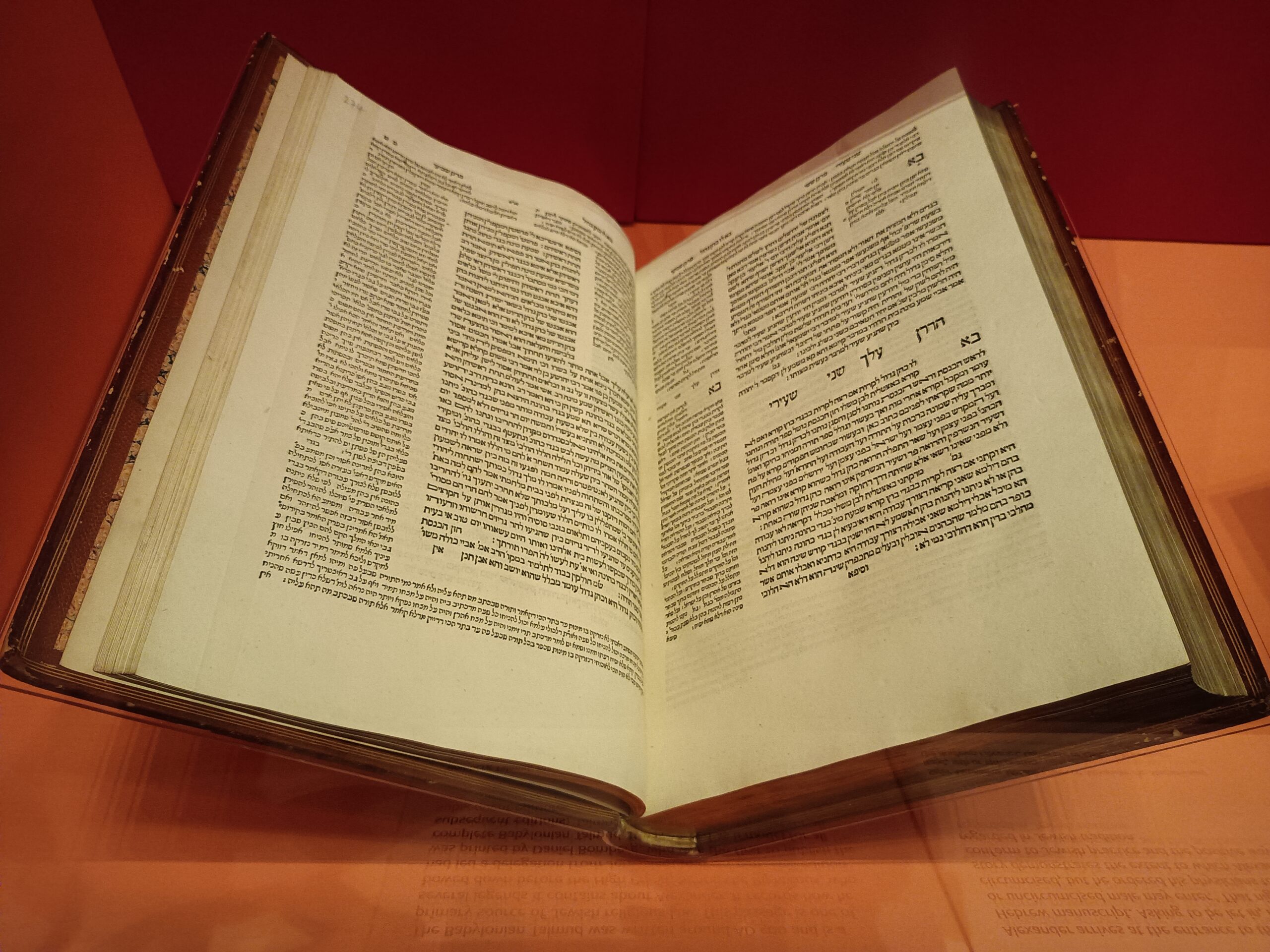At a Kohelet Policy Forum conference in Jerusalem last Wednesday, Israeli Prime Minister Benjamin Netanyahu (Likud) spoke of “an unprecedented [political] reality” in reference to United States Secretary of State Michael Pompeo’s comments in November that Jewish communities in the Samaria and Judea regions aren’t necessary a violation of international law.
The conference at Jerusalem’s Begin Heritage Center, dedicated to what some are calling the “Pompeo Doctrine” legitimizing Jewish life in the West Bank, featured a slew of Israeli and US political figures claiming that a rare opportunity exists for a diplomatic breakthrough that would greatly favor Israeli interests.
Secretary Pompeo himself addressed the crowd via video, reiterating his statement from November that Israeli communities in Judea and Samaria do not inherently violate international law.
“There is a window of opportunity. It opened, but it could close,” Netanyahu told those gathered at the conference.
The window of opportunity Netanyahu spoke of was taken by many to refer to US President Donald Trump’s closely-guarded “Deal of the Century” plan.
Despite several leaks that the Trump plan adheres to the traditional US policy of seeking to divide Israel into two separate states, conference organizers, speakers and attendees seemed to embrace a simplistic view of global politics that imagines the Trump administration’s interests as being aligned with those of Israel’s.
Kohelet Policy Forum president Moshe Koppel told journalists following the event that “while I do not know precisely what is in President Trump’s plan, I’m quite confident that, in accordance with the ‘Pompeo Doctrine,’ it will leave Israel in control of significant parts of Area C [of the West Bank] and will not give the Palestinians much unless they commit to a cessation of claims, which they will not do.”
“It is clearly in Israel’s interest to have the plan put forward as soon as possible,” he continued.
“It is extremely regrettable that political instability, and the danger that an inexperienced and incompetent politician might become prime minister, is preventing the plan from being advanced during the short window in which it is politically feasible for the Americans to do so.”
What may not have occurred to Koppel is the likely connection between Israel’s political instability and President Trump’s mysterious plan for our country. Sufficient evidence exists to support the theory that Trump has been using Yisrael Beiteinu leader Avigdor Lieberman to ensure the establishment of a government that would accept the Trump plan and survive its implementation.
Lieberman’s political machinations not only destabilized the coalition Netanyahu headed in 2018 but also twice prevented the formation of nationalist governments likely to reject the partition of the country, leading the nation to its third national election within a 12 month period.
It’s also likely that Netanyahu has been quietly using the domestic political instability to delay the unveiling of Trump’s plan, knowing the contents that many on the Israeli right seem to live in willful denial of. But despite the prime minister’s apprehension over the Trump plan, he’s nevertheless interested in capitalizing electorally from Pompeo’s statements and taking credit for what many potential Likud voters see as a major diplomatic achievement.
The new political reality that Netanyahu said “gives us the opportunity to liberate ourselves from old policies” clearly refers to the two-state paradigm of successive US administrations but fails to liberate Israel from the deeper problem – the very notion that Jerusalem should accept Washington’s dictates at all.
Despite superficial talk of independence from US control during the Barack Obama years, many Jewish nationalists have sadly embraced Donald Trump, exposing a slave mentality that requires US permission or approval to pursue Jewish national interests.
The inherent contradiction between Jewish nationalism and the desire to align with Trump and other right-wing forces throughout the world was clearly expressed by a special bottle of Psagot wine featured at last week’s Kohelet conference.

The proximity of the word “Pompeo” on the bottle to the winery’s signature plastic replica of the ancient “L’Ḥerut Tzion” (“for the freedom of Zion”) coin minted by the Zealots when they fought to free our land from Roman rule is especially expressive of an identity crisis within Israel’s national camp.
Should Israel reject any subjugation to the forces of empire as the coin suggests? Or should we embrace imperial rule when it grants us permission to pursue policies we perceive as being in our interests?
What the wine bottle label perfectly expresses is a lack of principle and ideological depth on the Israeli right, which clearly objects to foreign governments obstructing Jewish liberation but seems to have no real understanding for how imperialism actually functions and in what ways Israel falls victim to it.
The contradictions within Israel’s national camp today are reminiscent of a similar ideological crisis with Revisionist Zionism and the Etzel (National Military Organization) militia during the 1940s. While the Revisionist position was to pressure Great Britain for more favorable policies and the Etzel fought the “oppressive regime” that continued to act against Jewish interests, the far more politically advanced Leḥi (Fighters for the Freedom of Israel) identified British imperial interests in the region and therefore fought the “foreign regime” that had no business being in our land.
The very question today over which US administration is better for Israel is already the question of a slave expressing a preference for one master over another. Those deeply committed to Jewish liberation shouldn’t strive for a more understanding emperor in Washington but rather complete Israeli independence from the forces of empire.





